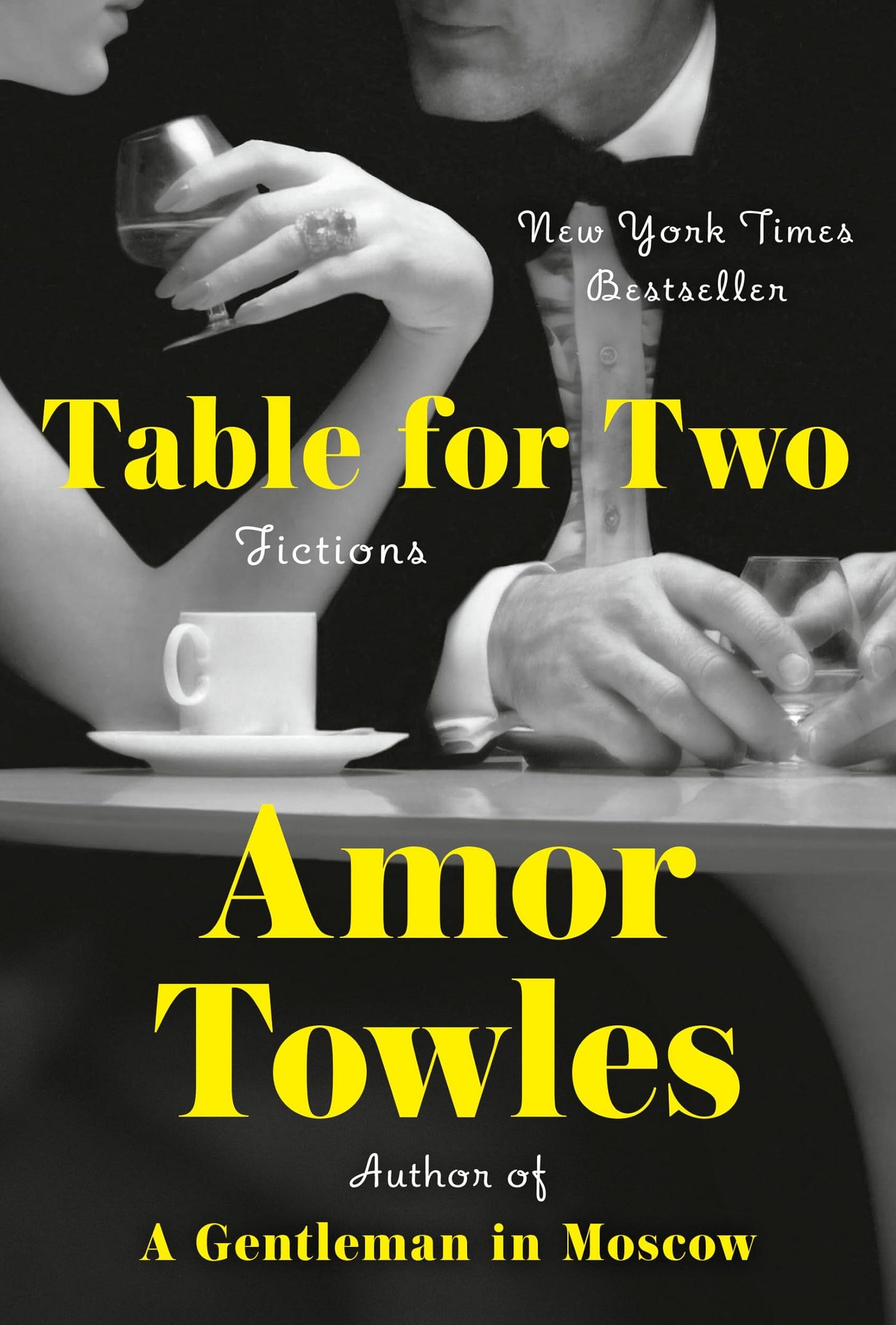I came a little late to Amor Towles. His 2016 novel A Gentleman from Moscow was out a few years before I picked it up, and enjoyed it sufficiently to circle back and read his first novel, The Rules of Civility. I bought The Lincoln Highway as soon as it was published in 2021, and found it to be good Christmas company, even if I didn’t like it quite as much as the other two.
Then Table for Two: Fictions came out last spring. It’s the kind of book that only a successful commercial writer gets to do—a collection of loose ends, some of them previously published—packaged into a set. I’m wary of titles like this, even if the cover was wonderfully alluring on the front tables of Barnes & Noble. It wasn’t being discounted much, so I put it on the back burner, remembering to request it as a birthday gift, which I duly received. Towles was once again Christmas reading, and I must say more satisfying than ever.
I think of Towles as a kind of cross between someone like Louis Auchincloss and F. Scott Fitzgerald. Like Auchincloss, Towles came from a moneyed background (his father was an investment banker), and like Auchincloss, his literary career was delayed by pecuniary considerations (Auchincloss was a lawyer at a white-shoe firm; Towles was a director at an equity firm for close to twenty years). Both writers are utterly at ease chronicling the lives of the rich but not famous with a sharp, unsentimental eye.
At the same time, Towles also exhibits a Fitgeraldian sense of glamor that edges toward sentimentality. There’s something Gatsbyesque about Count Alexander Ilyich Rostov of A Gentleman from Moscow, the courtly prisoner of a Russian hotel, and something Zeldaesque about the women of The Rules of Civility, set in the New York of the late 1930s, just after Fitzgerald’s heyday there. These traits carry over, and get intensified, in Table for Two.
The book essentially consists of two parts. The first is a set of short stories, led off by “The Line,” which is a bit of an anomaly in that it tells the story of a peasant couple sucked into the vortex of Moscow during the Russian Revolution. This story has a distinctly puckish, Tolstoyan air, and there’s something pleasing about its fools-rush-in-where-angels-fear-to-tread in a dangerously radicalizing country on the cusp of severe internecine violence.
The other five stories in the first part of Table for Two capture different facets of elite life, including the rare book market, classical music, and Renaissance painting (along with anatomizing the sources of money that make these pursuits possible). They capture a kind of culture in which mediocrity can be protected, but also one in which social grace can be cultivated and appreciated.
The second half of Table for Two is described as a novella, though coming in at over two hundred pages, I don’t see why it couldn’t be considered a novel (and if Towles wanted, it could have easily been published as such, as it indeed it originally was in a private edition). It’s a sequel to The Rule of Civility in which one of the main characters makes her way to Los Angeles and finds herself involved in a light noirish caper that features fictionalized versions of film mogul David Selznick and starlet Olivia de Havilland. De Havilland is an important figure in film history for her role in suing Warner Brother to get out of an onerous contract in a case that brought down the entire old studio system that prevailed from the twenties through the forties. Towles does a wonderful job of foreshadowing this in a story that involves pilfered photos at the time when de Havilland was lobbying to be cast in Gone with the Wind. It’s exceptionally deft and entertaining.
Towles is conspicuously out of step in a literary fiction market with other preoccupations. But he has nevertheless secured a strong footing on the cultural landscape of the 2020s.



